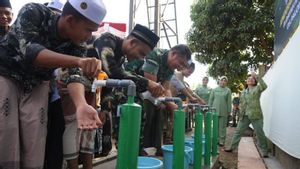The trend of layoffs of employees that have occurred in recent times has made many workers feel worried. It is recorded that there are as many as dozens of startup companies that have carried out layoffs or mass layoffs. This trend is said to continue in 2023 where there is a threat of a global recession.
However, employees or workers do not need to panic and worry. Government Regulations in Lieu of the Law on Job Creation, aka the Job Creation Perpu, have megatur 10 criteria for workers that cannot be terminated.
"Determination of employment on the grounds as referred to in Paragraph 1 is null and the employer is obliged to re-employ the worker/labor concerned," reads Article 153 Paragraph 2 of Law Number 13 of 2003 as amended in the Job Creation Perpu.
The provisions of the 10 criteria for employees who are not allowed to be laid off are contained in the Job Creation Perpu Article 153 Paragraph 1 Letter A to J. The following is a list of criteria:
The reasons or causes for the permitting of employee layouts have also been regulated in Article 154 paragraph (1) of Law No. 13 of 2003 concerning employment, Law No. 11 of 2020 concerning Job Creation, Government Regulation (PP) No. 35 of 2021 concerning Work Agreements of Certain Time, Power, Working Time and Rest Time, and Termination of Employment, article 36 stipulates this:
The following is the reason for termination of employment.
1. Companies merge, merge, takeover, or separate companies and workers/laborers are not willing to continue working relationships or employers are not willing to accept workers/laborers.
2. The company performs efficiency followed by the closure of the company or not followed by the closure of the company caused by the company experiencing losses.
3. Companies closed due to the company experiencing continuous losses for 2 (two) years.
4. Companies are closed due to force majeure.
5. The company is in a state of delays in debt payment obligations.
6. Bankrupt companies.
7. There is a request for termination of employment submitted by workers / laborers on the grounds that employers commit the following acts:
a. Menganaya, menghina secara kasar atau mengancam pekerja/kerja.
b. Perturb and/or order workers/laborers to commit acts that are against the laws and regulations.
c. Not paying the exact wages at the specified time for 3 (three) months in a row or more, even though the employer paid the wages on time after that.
d. Do not perform the obligations that have been promised to workers/laborers.
e. Order workers/laborers to carry out work outside those promised; or
f. Provide jobs that endanger the lives, safety, health, and decency of workers/laborers while the work is not included in the work agreement.
8. There is a decision of the institution to resolve industrial relations disputes which states that employers do not commit acts as referred to in letter g against applications submitted by workers/laborers and employers decide to terminate employment relations;
9. Workers/laborers resign on their own will and must meet the following conditions:
a. Apply for resignation in writing no later than 30 (three) days before the date of resignation.
b. Unbound in official ties, and
c. Continue to carry out its obligations until the date of resignation.
10. Workers/laborers are absent for 5 (five) working days or more consecutively without written information which is accompanied by valid evidence and has been summoned by entrepreneurs 2 (two) times properly and in writing.
11. Workers/laborers violate the provisions stipulated in the work agreement, company regulation, or collective work agreement and have previously been given the first, second, and third warning letters in a row each valid for a maximum of 6 (six) months unless stipulated otherwise in a work agreement, company regulation, or a joint work agreement.
12. Workers/laborers cannot do work for 6 (six) months due to being detained by the authorities for allegedly committing a crime.
13. Workers/laborers experience prolonged illness or defects due to work accidents and cannot do their job after exceeding the 12-month (twelve) limit.
14. Workers/laborers enter retirement age; or
15. Workers/laborers died.
That is information regarding the criteria for employees who should not be laid off. The government reminds companies not to lay off employees carelessly, but to comply with the regulations stipulated in the law.
Stay up to date with the latest domestic and foreign news on VOI. You present the latest and most recent nationally and internationally.
The English, Chinese, Japanese, Arabic, and French versions are automatically generated by the AI. So there may still be inaccuracies in translating, please always see Indonesian as our main language. (system supported by DigitalSiber.id)













